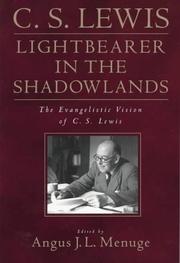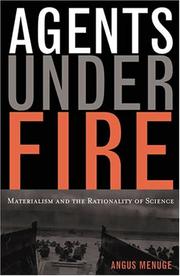| Listing 1 - 9 of 9 |
Sort by
|
Book
ISBN: 9781409450023 Year: 2013 Publisher: Farnham Ashgate
Abstract | Keywords | Export | Availability | Bookmark
 Loading...
Loading...Choose an application
- Reference Manager
- EndNote
- RefWorks (Direct export to RefWorks)
Human rights --- Secularism --- Ethics --- Irreligion --- Utilitarianism --- Atheism --- Postsecularism --- Secularization (Theology) --- Basic rights --- Civil rights (International law) --- Rights, Human --- Rights of man --- Human security --- Transitional justice --- Truth commissions --- Religious aspects --- Law and legislation

ISBN: 0891079610 Year: 1997 Publisher: Wheaton Crossway Books
Abstract | Keywords | Export | Availability | Bookmark
 Loading...
Loading...Choose an application
- Reference Manager
- EndNote
- RefWorks (Direct export to RefWorks)
Christian literature, English --- Evangelistic work --- History and criticism --- History --- Lewis, C. S. --- Religion.

Abstract | Keywords | Export | Availability | Bookmark
 Loading...
Loading...Choose an application
- Reference Manager
- EndNote
- RefWorks (Direct export to RefWorks)
Architecture intelligente (Téléologie) --- Christianisme et science --- Christianisme et sciences --- Christianity and science --- Conception intelligente (Téléologie) --- Création intelligente (Téléologie) --- Design [Intelligent ] (Teleology) --- Dessein intelligent (Téléologie) --- Geology -- Religious aspects --- Geology and religion --- Godsdienst en wetenschap --- Géologie et religion --- Intelligent design (Teleology) --- Intelligent ontwerp (Teleologie) --- Materialism --- Materialisme --- Matérialisme --- Modèle intelligent (Téléologie) --- Physicalism --- Rationalism --- Rationalisme --- Reductionism --- Reductionisme --- Reductionnisme --- Religion and science --- Religion et science --- Religion et sciences --- Religion et sciences naturelles --- Religion et technologie --- Religions et sciences --- Science -- Religious aspects --- Science and religion --- Science et christianisme --- Science et religion --- Sciences et christianisme --- Sciences et religion --- Sciences et religions --- Sciences naturelles et religion --- Technologie et religion --- Wetenschap en godsdienst --- Materialism. --- Rationalism. --- Reductionism. --- Religion and science. --- Intelligent design (Teleology).
Book
ISBN: 1785276492 1785276514 1785276484 1785276506 Year: 2021 Publisher: London, England ; New York, New York : Anthem Press,
Abstract | Keywords | Export | Availability | Bookmark
 Loading...
Loading...Choose an application
- Reference Manager
- EndNote
- RefWorks (Direct export to RefWorks)
For the 2019 IVR World Congress of Philosophy of Law meeting in Lucerne, Switzerland, Drs Barry W. Bussey and Angus J. L. Menuge organized a special workshop on the inherence of human dignity, featuring participation from philosophers, legal scholars, and legal practitioners from around the world. Many of the chapters in these volumes are the result of that invigorating two-day workshop. In addition, several new papers were solicited to round out each volume so that it offers broad coverage of the issues it addresses.
The second volume, Law and Religious Liberty, explores the value of dignity as a foundation for law. It addresses the following questions. What context is necessary to create an understanding of the need to protect human dignity? Is dignity a useful legal concept or not? If it is, what difference does it make if dignity is recognized in a state's constitution? Can we discover dignity by its de facto role in legal decisions? Should dignity be extended to groups? What are the practical, legal implications of various understandings of human dignity for international law, religious freedom cases and the permissibility of legal determination of religious doctrine?
Respect for persons --- Dignity. --- Dignity --- Law and legislation. --- Religious aspects. --- Human dignity --- Values --- Human rights --- Law and legislation
Book
ISBN: 1785276530 1785276557 1785276522 1785276549 Year: 2021 Publisher: London, England ; New York, New York : Anthem Press,
Abstract | Keywords | Export | Availability | Bookmark
 Loading...
Loading...Choose an application
- Reference Manager
- EndNote
- RefWorks (Direct export to RefWorks)
For the 2019 IVR World Congress of Philosophy of Law meeting in Lucerne, Switzerland, Drs Barry W. Bussey and Angus J. L. Menuge organized a special workshop on the inherence of human dignity, featuring participation from philosophers, legal scholars, and legal practitioners from around the world. Many of the chapters in these volumes are the result of that invigorating two-day workshop. In addition, several new papers were solicited to round out each volume so that it offers broad coverage of the issues it addresses.
The first volume, Foundations of Human Dignity, focuses on the foundational questions concerning the meaning, nature, and scope of human dignity, and our ability to know it. It addresses the following questions: It addresses the following questions. How was dignity understood by the drafters of the Universal Declaration of Human Rights? Can human dignity be grounded in natural characteristics of human beings accessible by reason, or must it be grounded in God? How can we recognize and promote dignity? What is the connection between dignity and religious liberty? Should dignity be understood in terms of autonomy or well-being? What is the origin of the new dignity jurisprudence, and is it defensible? Can dignity be understood as social characteristic? Can it be extended to artificially intelligent systems?
Dignity. --- Dignity --- Respect for persons --- Religious aspects. --- Law and legislation. --- Human rights --- Human dignity --- Values --- Law and legislation
Book
ISBN: 9781785276538 9781785276521 Year: 2021 Publisher: London Anthem Press
Abstract | Keywords | Export | Availability | Bookmark
 Loading...
Loading...Choose an application
- Reference Manager
- EndNote
- RefWorks (Direct export to RefWorks)
Book
ISBN: 9781785276491 9781785276484 Year: 2021 Publisher: London Anthem Press
Abstract | Keywords | Export | Availability | Bookmark
 Loading...
Loading...Choose an application
- Reference Manager
- EndNote
- RefWorks (Direct export to RefWorks)
Book
ISBN: 9781119375265 9781119375296 9781119375302 Year: 2018 Publisher: Hoboken, N.J. Wiley Blackwell
Abstract | Keywords | Export | Availability | Bookmark
 Loading...
Loading...Choose an application
- Reference Manager
- EndNote
- RefWorks (Direct export to RefWorks)
A groundbreaking collection of contemporary essays from leading international scholars that provides a balanced and expert account of the resurgent debate about substance dualism and its physicalist alternatives. Substance dualism has for some time been dismissed as an archaic and defeated position in philosophy of mind, but in recent years, the topic has experienced a resurgence of scholarly interest and has been restored to contemporary prominence by a growing minority of philosophers prepared to interrogate the core principles upon which past objections and misunderstandings rest. As the first book of its kind to bring together a collection of contemporary writing from top proponents and critics in a pro-contra format, The Blackwell Companion to Substance Dualism captures this ongoing dialogue and sets the stage for rigorous and lively discourse around dualist and physicalist accounts of human persons in philosophy. Chapters explore emergent, Thomistic, Cartesian, and other forms of substance dualism broadly conceived in dialogue with leading varieties of physicalism, including animalism, non-reductive physicalism, and constitution theory. Loose, Menuge, and Moreland pair essays from dualist advocates with astute criticism from physicalist opponents and vice versa, highlighting points of contrast for readers in thematic sections while showcasing today s leading minds engaged in direct debate. Taken together, essays provide nuanced paths of introduction for students, and capture the imagination of professional philosophers looking to expand their understanding of the subject. Skillfully curated and in touch with contemporary science as well as analytic theology, The Blackwell Companion to Substance Dualism strikes a measured balanced between advocacy and criticism, and is a first-rate resource for researchers, scholars, and students of philosophy, theology, and neuroscience.
Philosophical anthropology --- Philosophy and psychology of culture --- Mind and body. --- Dualism. --- Materialism.
Book
ISBN: 9781119695264 1119695260 Year: 2018 Publisher: Chichester Wiley Blackwell
Abstract | Keywords | Export | Availability | Bookmark
 Loading...
Loading...Choose an application
- Reference Manager
- EndNote
- RefWorks (Direct export to RefWorks)
Mind and body --- Dualism --- Materialism
| Listing 1 - 9 of 9 |
Sort by
|

 Search
Search Feedback
Feedback About UniCat
About UniCat  Help
Help News
News